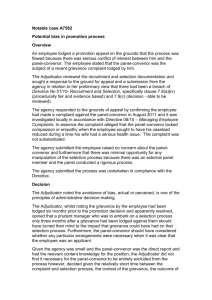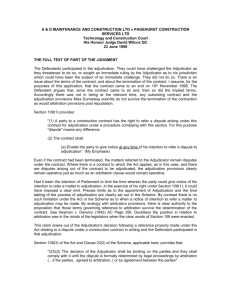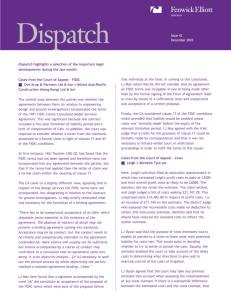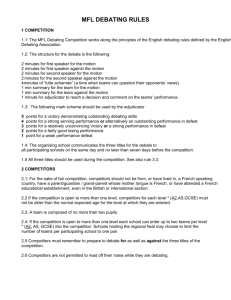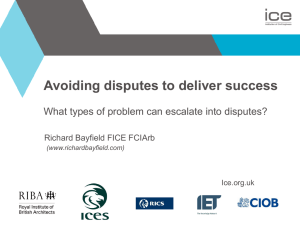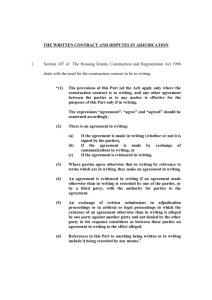Summer 2012 In Site
advertisement
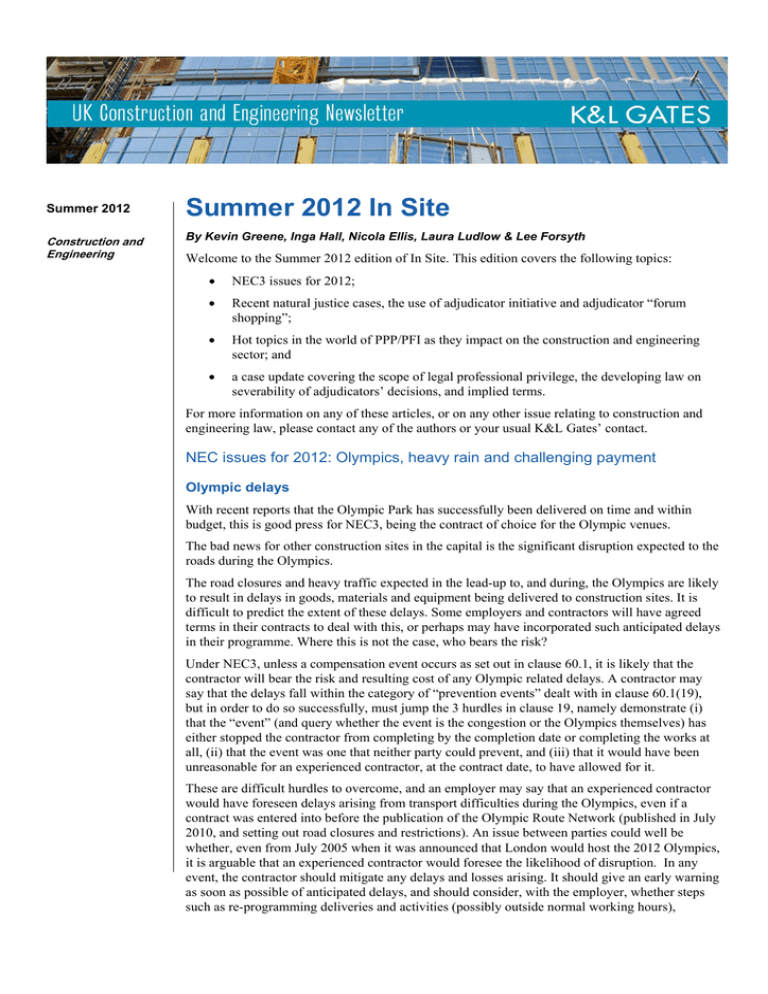
Summer 2012 Construction and Engineering Summer 2012 In Site By Kevin Greene, Inga Hall, Nicola Ellis, Laura Ludlow & Lee Forsyth Welcome to the Summer 2012 edition of In Site. This edition covers the following topics: NEC3 issues for 2012; Recent natural justice cases, the use of adjudicator initiative and adjudicator “forum shopping”; Hot topics in the world of PPP/PFI as they impact on the construction and engineering sector; and a case update covering the scope of legal professional privilege, the developing law on severability of adjudicators’ decisions, and implied terms. For more information on any of these articles, or on any other issue relating to construction and engineering law, please contact any of the authors or your usual K&L Gates’ contact. NEC issues for 2012: Olympics, heavy rain and challenging payment Olympic delays With recent reports that the Olympic Park has successfully been delivered on time and within budget, this is good press for NEC3, being the contract of choice for the Olympic venues. The bad news for other construction sites in the capital is the significant disruption expected to the roads during the Olympics. The road closures and heavy traffic expected in the lead-up to, and during, the Olympics are likely to result in delays in goods, materials and equipment being delivered to construction sites. It is difficult to predict the extent of these delays. Some employers and contractors will have agreed terms in their contracts to deal with this, or perhaps may have incorporated such anticipated delays in their programme. Where this is not the case, who bears the risk? Under NEC3, unless a compensation event occurs as set out in clause 60.1, it is likely that the contractor will bear the risk and resulting cost of any Olympic related delays. A contractor may say that the delays fall within the category of “prevention events” dealt with in clause 60.1(19), but in order to do so successfully, must jump the 3 hurdles in clause 19, namely demonstrate (i) that the “event” (and query whether the event is the congestion or the Olympics themselves) has either stopped the contractor from completing by the completion date or completing the works at all, (ii) that the event was one that neither party could prevent, and (iii) that it would have been unreasonable for an experienced contractor, at the contract date, to have allowed for it. These are difficult hurdles to overcome, and an employer may say that an experienced contractor would have foreseen delays arising from transport difficulties during the Olympics, even if a contract was entered into before the publication of the Olympic Route Network (published in July 2010, and setting out road closures and restrictions). An issue between parties could well be whether, even from July 2005 when it was announced that London would host the 2012 Olympics, it is arguable that an experienced contractor would foresee the likelihood of disruption. In any event, the contractor should mitigate any delays and losses arising. It should give an early warning as soon as possible of anticipated delays, and should consider, with the employer, whether steps such as re-programming deliveries and activities (possibly outside normal working hours), Summer 2012 In Site suspension during the games and/or acceleration thereafter were cost-effective and viable steps in mitigation. Adverse weather Another issue that may have arisen on construction sites recently is the heavy rain falling throughout April and into June. After the wettest April in 100 years, to what extent will the contractor be entitled to claim an extension of time under NEC3 for disruption to progress on site? Unlike other standard forms which refer to “exceptionally adverse weather”, NEC3 takes a more prescriptive, objective approach. The Contract Data identifies that cumulative rainfall and the number of days with more than 5mm of rainfall are to be recorded each month. Under clause 60.1(13), the contractor will only be entitled to claim additional time or money for the difference between the weather conditions encountered and the historical weather data shown to occur “on average less frequently than once in ten years”. For example, if there has been no more than 4 days of rainfall over 5mm in April occurring once in ten years, and April 2012 saw 6 days of rainfall over 5mm, the contractor would only be able to claim for 2 days. The location of where the weather measurements should be taken from is stated in the Contract Data and this should be as close to the site as possible to represent accurately the conditions experienced on site. Challenging payment If the employer considers that the project manager has assessed an amount due to the contractor incorrectly, perhaps including an incorrect assessment of the impact of a compensation event, the employer can ask an adjudicator or the stated “tribunal” (i.e an arbitrator or the Courts) to open up and review the project manager’s decision. Recent Scottish case law confirms that the party seeking to challenge payment bears the burden of proof. Although a project manager can correct his or her own assessments or certificates in subsequent assessments, it would be unusual for him or her to do so unless asked to by one of the parties. In terms of clauses 50 and 51 of NEC3, the sum assessed and certified by the project manager remains the sum due unless corrected by the project manager, or by an adjudicator or tribunal exercising their powers to review and revise any action or inaction of the Project Manager. The party seeking correction should bear the burden of persuasion. If (say) the contractor seeks further payment, the burden is on him. If the employer seeks to argue that the project manager’s assessment is too high, the onus is on him. Natural justice and an adjudicator’s initiative Natural justice (or the lack of it) has long been one of the more popular themes in adjudication cases. The decisions reached by the courts generally take a reassuring common sense approach to the question of whether or not the parties have been given their right to a fair hearing and been heard by an impartial tribunal. An adjudicator who takes into account material that was not before the parties, or applies his own experience and knowledge to a particular question, may be in breach of the rules of natural justice if he does not give the parties an opportunity to comment on his approach. A breach must be material rather than peripheral, such as where the adjudicator fails to bring to the parties' attention a particular point that is either decisive or of considerable importance to the outcome of the dispute. 2 Summer 2012 In Site “A frolic of his own” Two recent interesting cases look at situations where an adjudicator’s exercise of his initiative may breach the rules of natural justice. Paragraph 13 of the Scheme for Construction Contracts (England and Wales) Regulations 1998 states that adjudicators may take the initiative in ascertaining the facts and the law necessary to determine the dispute, and shall decide on the procedure to be followed in the adjudication. In practice, however, adjudicators need to be careful when exercising such initiative so as to ensure it does not breach the rules of natural justice. Central to ensuring this is the need to inform the parties of what the adjudicator intends to do, and giving them an opportunity to comment. This was the point in Herbosh-Kiere Marine Contractors Ltd v Dover Harbour Board [2012] EWHC 84 (TCC) (a case relating to a contract for the removal of a ship from Dover Harbour) where the court had to consider whether the adjudicator had breached the rules of natural justice by using a method to assess the sum due to the contractor on the final account which neither party had put to him and upon which they had been given no opportunity to comment. The contract provided for specific rates to be applied to specific resources but, despite this, the adjudicator, without consultation with the parties, decided to use a different composite rate of his own devising and which made a difference (of hundreds of thousands of pounds) in the delay damages calculated. There was no clear explanation of why he did this, with the court concluding that “[i]n essence, and doubtless for what he believed were good and sensible reasons, the adjudicator has gone off "on a frolic of his own"….” If the “frolic” had not made any material difference to the outcome then its existence may not have been sufficient to prevent enforcement but the situation is very different where, as in this case, the breach is material and has led to a very substantial financial difference in the outcome. The adjudicator’s decision could not be enforced as he had exceeded his jurisdiction by using a method of assessment which did form part of the dispute referred to him and because he “…breached the rules of natural justice, doubtless unwittingly, by deciding the case not only on the basis not argued by either party at any stage but also without giving each party the opportunity to make submissions at least on the method of assessment which the adjudicator considered that he should adopt.” Phone a friend? The Scottish case of Highlands and Islands Authority Ltd V Shetland Islands Council [2012] ScotCS CSOH takes this concept a step further and suggests that even a relatively minor – but non-communicated – exercise of initiative may be enough to breach the rules of natural justice. A dispute arose between the parties to a runway extension project in the Shetlands. The employer (Shetlands Island Council) successfully argued in the resulting adjudication that defects in the runway were caused by breach of contract by the consultant (Highlands and Islands Authority Ltd). The contract was based on the NEC Professional Services Contract. The key point of interest in this case was that, prior to issuing his decision, the adjudicator called a barrister to confirm his understanding of clause 41.3 of the contract dealing with liability for the cost of correcting uncorrected defects. In relation to the call (which only lasted a few minutes) the adjudicator said in his witness statement that he was not seeking, and was not given, a formal oral opinion by counsel, but was merely seeking confirmation of the view he already held on the meaning of the clause. The problem was, however, that he did not tell the parties that he had discussed the clause with counsel, nor did he raise any concerns about the meaning of the clause with the parties. The consultant became aware of the conversation after the adjudicator issued his decision and contacted the adjudicator for clarification. The adjudicator said that no oral advice had been given, insisting the conversation was merely confirming his view on the meaning of the clause. When the 3 Summer 2012 In Site employer started proceedings to enforce the adjudicator’s decision the consultant raised a natural justice challenge. The Scottish Outer House held that the adjudicator had breached the rules of natural justice because he failed to advise the parties that he had contacted counsel by telephone to confirm a legal point. Although the contact was informal (and free) it nevertheless constituted legal advice. The matter that the adjudicator asked counsel about was, in essence, what future damages the employer was entitled to. This question was central to his task and it affected the majority of the sum he awarded. Hence, the breach of natural justice did not fall into the category of peripheral or irrelevant breach which could potentially be ignored. Although the adjudicator may have formed his own view as to the clause's meaning, he was obliged to inform the parties and give them an opportunity to make submissions to him. Consequently, the adjudicator provided "an opportunity... for injustice to be done". Adjudicator forum shopping and the forming of provisional views The question of whether the exercise of initiative amounted to apparent bias was considered in the Court of Appeal decision in Lanes Group plc v Galliford Try Infrastructure Limited [2011] EWCA Civ 1617, which also examined the question of adjudicator forum shopping. One of the issues between the parties was who the “true” adjudicator was. Galliford (as main contractor) had a dispute with Lanes (as subcontractor) and applied to the relevant adjudicator nominating body (the ICE) for the appointment of an adjudicator. The ICE appointed Mr Howard Klein, who accepted the appointment. However, Galliford did not serve a referral as they objected to Mr Klein’s appointment (on the basis that there was a “history” between him and their solicitor which they said would make it difficult for him to be seen to be impartial in the new adjudication). Galliford’s solicitors then, honestly but mistakenly believing Mr Klein to be disqualified on grounds of bias, served a fresh notice of adjudication, and the ICE appointed a fresh adjudicator, Mr Daniel Atkinson. After an unsuccessful attempt in the TCC to obtain an injunction to stop Mr Atkinson acting (on the grounds that Mr Klein was the only adjudicator validly appointed to resolve the dispute), the adjudication under Mr Atkinson proceeded. Galliford served its referral documents but, rather than submitting a response and stating that it nevertheless maintained its jurisdictional challenge, Lanes decided not to serve a response at all. A few days after the deadline for the response, Mr Atkinson took the unusual step of sending the parties a document titled “Preliminary Views and Findings of Fact”. In his covering letter to that document he said he was issuing the document to assist his examination of the facts and the law and to allow the parties the opportunity to make further submissions by a stated date. Although the Preliminary View document was expressed in the language of a concluded decision (using phrases such as "I find" and "I hold"), Mr Atkinson had included a notice at the beginning that such statements were no more than preliminary views and findings of fact and are “a step in making the decision and I am not bound by them”. Lanes (as well as Galliford) did make submissions in response to this and Mr Atkinson went on to make his final decision (in favour of Galliford). Lanes challenged the validity of Mr Atkinson’s appointment and decision on the basis that he lacked jurisdiction and because he was biased in having reached firm conclusions in the “Preliminary Views” document before considering Lanes’ submissions. Galliford started enforcement proceedings and the two actions were heard by His Honour Judge Waksman QC. He dismissed Lanes’ challenge to Mr Atkinson’s jurisdiction, finding that Galliford was entitled to start a second adjudication, despite allowing the first adjudication to lapse as a result of failing to serve referral documents. The judge went on to hold however that Mr Atkinson did appear to have made up his mind by issuing the Preliminary View before he had received or considered Lanes’ 4 Summer 2012 In Site submissions and, accordingly, his decision was a nullity on the grounds of apparent bias. As neither party was happy with the decisions of the TCC they both appealed to the Court of Appeal. Jackson LJ upheld the TCC decision regarding jurisdiction and, in doing so, addressed the question of forum shopping. Although it could not be correct that a referring party should be permitted to withhold service of the referral documentation so that the adjudication lapses, time and again, if it did not like the adjudicator appointed (and in such situations an injunction may be an appropriate remedy) there may be good reasons why a referring party does not follow through with a reference, and the right to adjudicate that dispute would not be lost forever in those situations. The Court of Appeal felt that Galliford’s actions fell within the latter category (in that it believed it had genuine reasons to object to Mr Klein). The Court of Appeal reversed the TCC decision on the apparent bias issue and held that the findings contained in Mr Atkinson’s Preliminary Views document were (as they were stated to be) provisional views only. Applying the “fair minded and informed observer” test (Porter v McGill (2001) and Gillies v Secretary of State for Work and Pensions (2006)), Jackson LJ held that the fair minded observer would have no difficulty in characterising the Preliminary View as a provisional view, disclosed for the assistance of the parties, and not as a final determination reached before Mr Atkinson had considered Lanes’ submissions and evidence. Jackson LJ concluded with a comment affirming the essential character of adjudication: “I am reinforced in this conclusion by the fact that we are dealing with an adjudication decision, not an arbitration award or a judicial decision. Adjudication is a rough and ready process carried out at great speed. Vast masses of submissions and evidence have to be assimilated by the adjudicator in a short space of time. The adjudicator will fashion his procedure in whatever way enables him to discharge his onerous duties most swiftly, effectively and fairly”. Projects news PFI Review HM Treasury launched a review of the PFI model in November 2011 with a view to gathering lessons learnt over the last 20 years and developing a leaner, cheaper and more flexible model for the procurement of public infrastructure. The PFI industry has sought to be actively involved in the consultation process and HM Treasury has received approximately 150 submissions from industry bodies, professional advisers and public sector organisations in response to its call for evidence. A specific area under consideration is how capital markets can be better utilised as a source of funds for financing infrastructure. Investment by pension funds in particular is an increasing trend in other mature PFI markets such as Australia and Canada and the Coalition Government is keen to encourage pension funds to play a stronger role in the financing of infrastructure in the UK. A number of pension funds have already expressed interest in investing in PFI projects and have signed a Memorandum of Understanding with HM Treasury. Mini-perm funding structures, the RAB (Regulated Asset Base) financing model and Tax Increment Financing (TIF) are also being considered as alternatives to the current long-term debt finance model as part of the overall PFI review. The outcome of the PFI review is expected to be released by HM Treasury this summer. 30-day time limit for challenging a public procurement procedure On 1st October 2011 the time limit for bringing a claim on the basis of a breach of public procurement rules changed. In the past, claims had to be brought "promptly but in any event not later than three months". Now claimants must act quickly as they only have 30 days from the date 5 Summer 2012 In Site they knew or ought to have known of the breach of rules. See the Public Procurement (Miscellaneous Amendments) Regulations 2011. New EU thresholds for public contract Since January 2012, the new thresholds applying to public contracts are: • Supply or service contracts awarded by central government entities: £113,057; • Supply or service contracts awarded by other contracting authorities: £173,934; and • Works contracts: £4,348,350 Public authorities awarding contracts that are below the EU thresholds still need to comply with the general principles of European and public law such as non discrimination, equality between bidders and transparency (see Scottish case Sydey Limited v Clackmannanshire Council [2011] CSOH 194 dated 24 November 2011). Case update Legal professional privilege Legal professional privilege, entitling one party to withhold production of evidence from the other party, includes legal advice privilege (which applies to confidential communications between lawyers and clients made for the dominant purpose of giving or seeking legal advice) and litigation privilege (applicable where litigation is actual or pending). The issue considered in the recent Walter Lilly case was whether documents generated by a claims consultant (even one with legally qualified personnel) attract legal advice privilege. The short answer was “no”. During the course of a major house construction project the client engaged claims consultants to provide “contractual and adjudication advice” over an 18 month period. The consultants’ retainer letter included rates for “legally qualified persons” but dealt separately with the appointment of outside solicitors to advise if necessary. The majority of advice received came from two individuals who had trained as barristers and the client gave evidence that what he needed, and thought he was getting from the consultants, was legal advice. A dispute arose between the parties regarding loss and expense arising from the delays. During the disclosure exercise, some correspondence with the consultants was disclosed, but privilege was claimed over the rest. At the beginning of the hearing, the contractor applied for disclosure of all of the consultants’ documents. The primary argument revolved around whether or not the consultants were engaged as lawyers. The defendants argued that a client who in good faith instructs an organisation or person which he mistakenly believes is a qualified solicitor/barrister and then receives legal advice from them is entitled to the legal advice privilege protection. Akenhead J held that the contractor's disclosure application should succeed as legal advice privilege did not attach to the consultants’ documents. The court relied on R (Prudential plc and another) v Special Commissioner of Income Tax and another (2010), where the Court of Appeal held that common law legal professional privilege does not apply to any professional other than a qualified lawyer. In reaching its judgment, the court took a number of factors into account: The consultant had only been retained to provide "contractual and adjudication advice" and this is not legal advice as such. Instead, it provided project handling advice. 6 Summer 2012 In Site It did not say it was a firm of solicitors or group of barristers, nor did it offer such services (indeed it referred in its retainer to the possible need to instruct solicitors), and nor were these services among the services the claims consultant offered to the client. The fact that the client honestly understood that the individuals he dealt with were qualified and practising barristers or solicitors was immaterial because the consultants had not been retained to provide the services of barristers or solicitors. Given the prevalence of claims consultants being retained by clients either to give general project management advice or to represent them in adjudications, this case highlights the importance of ensuring the exact nature of the services to be provided are agreed. Clients need to understand that not all advice attracts privilege. In light of Akenhead J's comments, if the claims consultant does not engage a practising solicitor or barrister to provide legal advice to a party, those documents will have to be disclosed (unless litigation privilege can be claimed). That was not an issue in this case as the consultants’ retainer had come to an end before the dispute between the parties arose. Severability of decisions Until 2008, the result of a successful challenge to an adjudicator’s jurisdiction (on natural justice or other grounds) would be that his decision would be unenforceable in its entirety. This settled position began to be challenged by the obiter comments of Akenhead J in Cantillon v Urvasco (2008) and Bovis Lend Lease v The Trustees of the London Clinic (2009) and subsequent case law. The court’s obiter comments in Cantillon v Urvasco indicated that an adjudicator’s decision could be severed where he has determined two or more disputes and the successful challenge only relates to one of the disputes. This concept was developed in the Bovis Lend Lease decision, where a claim had been brought for an extension of time and consequent loss and expense. The court indicated that where no dispute in relation to the loss and expense claim had crystallised, then it could sever the ruling on the crystallised extension of time dispute from the ruling on the other (non-crystallised) claim. The recent decision of Akenhead J in Working Environments Ltd v Greencoat Construction Ltd [2012] EWHC 1039 is important as he held that not all the issues before the adjudicator had crystallised at the time of the notice of adjudication, and the parts of the adjudicator’s decision dealing with those items could be severed from the remainder. The particular facts of relevance to this decision were that certain additional items were added to a revised withholding notice which had been submitted after the notice of adjudication had been served. Those additional items increased the amount of the withholding notice, and the adjudicator took them into account when making his decision on sums due. Working Environments Ltd (the subcontractor against which the withholdings were made) successfully challenged this on the basis that, at the time Greencoat had served the notice of adjudication, no dispute had yet crystallised in respect of those additional items. Accordingly, it argued, the adjudicator did not have jurisdiction to consider those items. Akenhead J agreed and severed them from the sum the adjudicator decided was due. The remainder of the adjudicator's decision was enforced. In reducing the sum awarded by the adjudicator to adjust for those 2 items, Akenhead J said he could see no good reason why the “substance” of the adjudicator’s decision should not be enforced, and that to enforce the bulk of the decision “is consistent with the authorities as set out in Cantillon v Urvasco”. Although the Working Environments case confirms the path the courts are taking in relation to severability of adjudicator’s decisions, the limitations of the decision need to be borne in mind. In Working Environments the parts of the decision which were to be severed could be clearly distinguished from the remainder as they related to specific, distinct, items. Such clarity between the various parts of an adjudicator’s decision will not always be present. Further, there is likely to continue to be greater ease in severing a decision where an adjudicator has exceeded his 7 Summer 2012 In Site jurisdiction because of a ”no dispute” argument than where the enforcement challenge is based on a breach of natural justice. Such a breach, if established, is more likely to be seen as “tainting” the whole decision. Implied terms: Leander Construction Limited v Mulalley and Company Limited [2011] EWHC 3449 (TCC) The decision in this case affirms the courts’ reluctance to imply time-related obligations on contractors in circumstances where the contract contains express completion obligations. In particular, the court was asked to consider whether the sub-contractor had an implied obligation to proceed regularly and diligently. The sub-contract between Mulalley (as main contractor) and Leander (as sub-contractor) specified a completion date (with liquidated damages attached to delays in achieving it), but there were no milestone or sectional completion dates. There was no contract programme, but an activity schedule was appended, with the dates shown on it stated to be indicative only. Works progressed and it became clear that the sub-contract works were in delay with each party blaming the other. Mulalley served two withholding notices against payment applications received from Leander, citing as grounds that Leander had failed to carry out the sub-contract works in accordance with the dates and periods set out in the activity schedule. Leander challenged the validity of the withholding notices. Mulalley argued that although the subcontract did not expressly say so, Leander had an implied obligation to proceed regularly and diligently with the works. It argued that such an implied term must be incorporated into the subcontract in order to give it business efficacy. Leander said there was no such implied term (the sub-contract operates perfectly well without it) and hence no ground for withholding. As far as the activity schedule was concerned, it was common ground that the dates and periods set out in it were not contractually binding, but Mulalley argued that it represented the best way to measure whether or not Leander had complied with the alleged implied term. Coulson J reviewed the authorities on implication of terms, including the formulation for business efficacy implication (BP Refinery (Westernport) Pty Ltd v Shire of Hastings [1978] and the (more limited) authorities on what is meant by “regularly and diligently”. In GLC v Cleveland Bridge and Engineering (1984) it was said to colloquially mean to “get on with it” Having reviewed these authorities, Coulson J held that Mulalley had failed to show that the implied term to proceed regularly and diligently was necessary to give business efficacy to the contract. His reasons were as follows: The cases show that the courts are slow to imply terms, particularly when (as here) there are already detailed terms – Mulalley had “not come close” to demonstrating that the alleged term was necessary to make the contract work. Coulson J cited the numerous cases where the courts have declined to imply a term imposing an interim obligation at to rate of progress – the principle being that so long as there is an obligation to complete by a certain date, it is unnecessary and unhelpful to impose other interim progress obligations on the contractor. The terms of the sub-contract itself show there was no need for an implied term, in particular because there was one completion date (with consequences flowing from a failure to achieve it) and due to the existence of a number of other contractual terms pursuant to which Mulalley could exercise control over Leander’s performance (such as the obligation to comply with instructions and a duty to co-operate). In the case of NEC3 for example, the obligation to meet stated Conditions by defined Key Dates is already a powerful tool regarding interim performance obligations, which can be boosted further 8 Summer 2012 In Site by amending the general clause 20 obligation to provide the Works not only in accordance with the Works Information, but in a regular and diligent manner. Authors: Kevin Greene Laura Ludlow kevin.greene@klgates.com +44.(0)20.7360.8188 laura.ludlow@klgates.com +44.(0).20.7360.8236 Inga Hall Lee Forsyth inga.hall@klgates.com +44.(0)20.7360.8137 lee.forsyth@klgates.com +44.(0)20.7360.8190 Nicola Ellis nicola.ellis@klgates.com +44.(0).20.7360.8261 9

